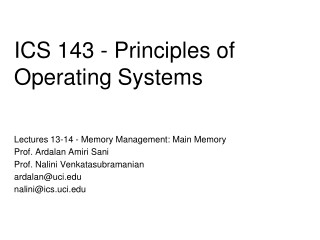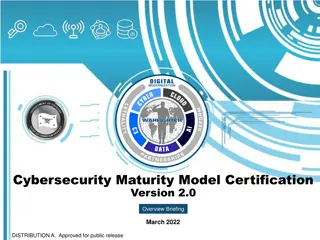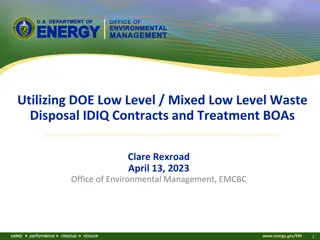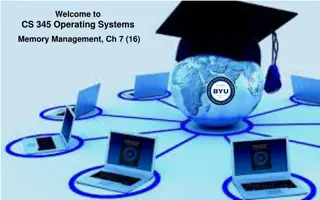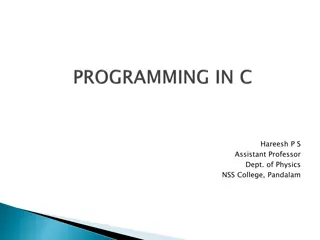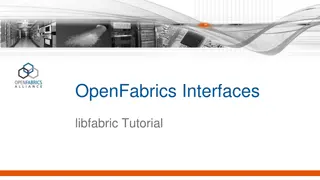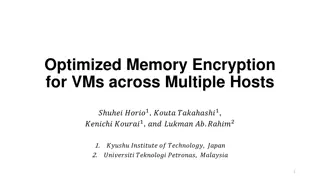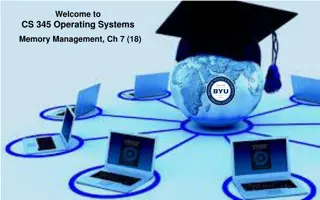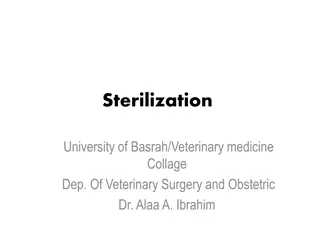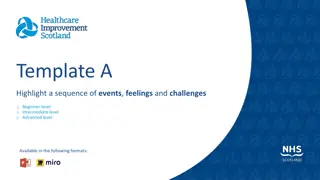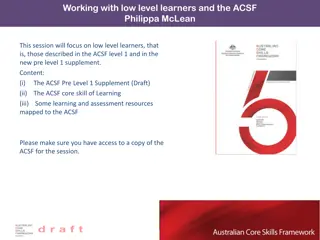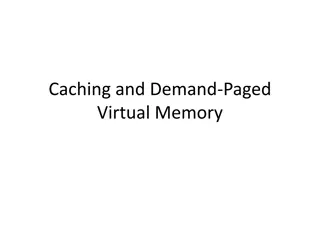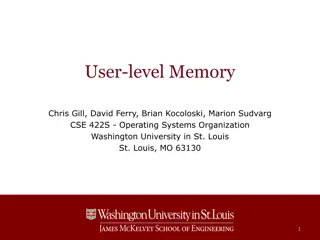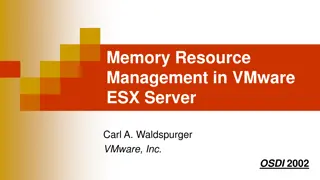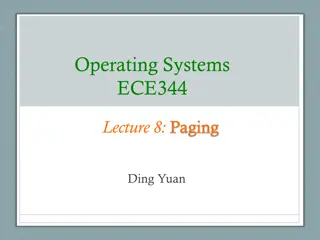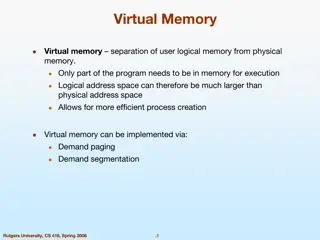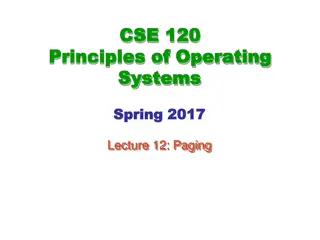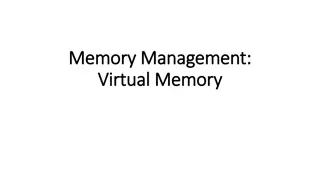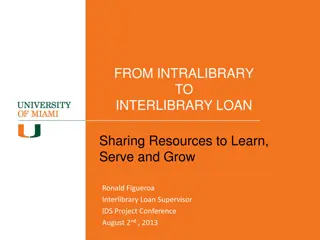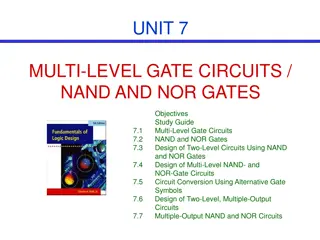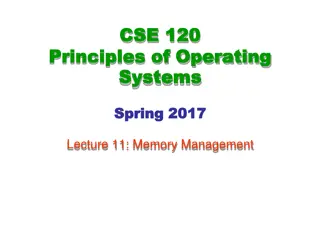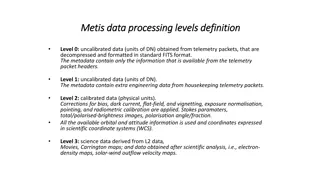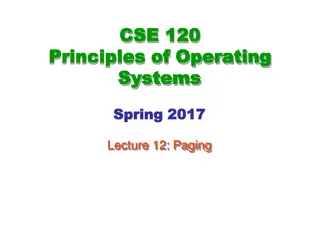ICS 143 - Principles of Operating Systems
The principles and techniques of memory management in operating systems, including swapping, contiguous allocation, paging, and segmentation. Understand the importance of virtualizing resources and controlling overlap, protection, and translation of memory.
1 views • 52 slides
Awards Orientation Seminar 2024: Recognitions and Guidelines for Submitting Awards
Explore the Awards Orientation Seminar 2024 featuring different levels of recognitions, including awards at LO level, zone level, JCI India level, and international level. Discover the criteria and guidelines for submitting zone awards, eligibility requirements, and the diverse categories of awards
9 views • 18 slides
Navigating the Executive Landscape: The Art of C-Level Recruitment
\"Navigating the Executive Landscape: The Art of C-Level Recruitment\" is a comprehensive guide for C-level recruiters, providing invaluable insights and strategies for navigating the complexities of c level recruitment. Delve into the intricacies of executive search with expert guidance tailored to
2 views • 6 slides
Crafting Success: Effective Techniques in C-Level Recruiting
\"Crafting Success: Effective Techniques in C-Level Recruiting\" delves into the strategic approaches and methodologies crucial for identifying, attracting, and securing top-tier executive talent. Explore proven techniques in c-level recruiting and c-level staffing that drive organizational growth a
1 views • 6 slides
C-Level Recruitment: Best Practices for Identifying High-Impact Leaders
\"C-Level Recruitment: Best Practices for Identifying High-Impact Leaders\" delves into effective strategies for finding and hiring top-tier executives. This guide covers crucial aspects of C-Level recruitment, from leveraging technology and data analytics to conducting thorough assessments and fost
0 views • 9 slides
C-Level Staffing Solutions: Building a Strong Executive Team
\"C-Level Staffing Solutions: Building a Strong Executive Team\" explores effective strategies for identifying and recruiting top-tier executive talent. Learn how to navigate the challenges of C-level recruiting and ensure your leadership team drives organizational success. This guide provides insig
0 views • 6 slides
A Level Textiles FAQs Answered: Studio Access, Course Requirements, University Pathways
Gain insights into utilizing textiles studio facilities, pursuing A Level Textiles without GCSE background, recommended A Level subject pairings, and universities A Level Textiles students have progressed to. Understand the opportunities, requirements, and pathways in the field of textiles education
0 views • 8 slides
Overview of CMMC 2.0 Cybersecurity Maturity Model Certification
The CMMC 2.0 introduces a streamlined model with three levels, focusing on protecting controlled unclassified information (CUI) with requirements aligned with NIST standards. Assessments vary for each level, including self-assessments for Level 1 and third-party assessments for Level 2. Government o
3 views • 8 slides
Evolution of Multi-Level Planning in India
Explore the historical background and stages of multi-level planning in India, from the national level to the grassroots Panchayat level. Learn about the transition from the Planning Commission to NITI Aayog at the national level and the crucial role of state Planning Boards in coordinating developm
0 views • 13 slides
Explore the Benefits of Studying A-Level Polish
Discover why studying A-Level Polish can enhance your language skills, cultural awareness, and career opportunities. Native speakers or those with a GCSE in Polish can excel in this course, gaining valuable skills in speaking, reading, and writing while delving into Polish culture, society, and hist
0 views • 19 slides
Understanding Low Level Concerns in Safeguarding Children and Young People
Safeguarding children and young people involves addressing low level concerns, which may not meet harm thresholds but still require attention. Examples include inappropriate behavior towards children and breaches of conduct. The importance of setting out policies for low level concerns is highlighte
0 views • 18 slides
Understanding the Impact of Temperature on Fermi Level in Semiconductors
The Fermi level plays a crucial role in determining the behavior of electrons in semiconductors at different temperatures. As temperature increases, the Fermi level shifts, affecting the generation of free electrons and holes in the valence and conduction bands. In intrinsic semiconductors, electron
2 views • 53 slides
Utilizing DOE Low-Level & Mixed Low-Level Waste Disposal Contracts
EMCBC manages disposal and treatment contracts for Low-Level Waste (LLW) & Mixed Low-Level Waste (MLLW). Eligible users include DOE offices, prime contractors, and subcontractors. Services cover various waste types including radioactive materials, sealed sources, and TSCA-regulated waste. Specific c
0 views • 19 slides
Memory Management Techniques in Operating Systems
Operating systems employ various memory management techniques such as fixed partitioning, dynamic partitioning, paging, segmentation, and virtual memory to efficiently utilize memory resources. These techniques help in organizing memory allocation for programs, managing fragmentation, and optimizing
0 views • 17 slides
Understanding Programming Languages: Levels and Basics
Programming languages facilitate communication between humans and computers, with machine language being the fundamental binary code understood by computers. Different levels of programming languages exist, from low-level machine language to high-level languages like C. Natural languages are meant f
0 views • 35 slides
Understanding Memory Management Techniques: Segmentation vs. Paging
Memory management is crucial in computer systems to optimize performance and resource utilization. Segmentation and paging are two important techniques used for managing memory efficiently. Segmentation allows for the independent growth and shrinking of different memory tables, while paging provides
2 views • 14 slides
Understanding libfabric: A Comprehensive Tutorial on High-Level and Low-Level Interface Design
This tutorial delves into the intricate details of libfabric, covering high-level architecture, low-level interface design, simple ping-pong examples, advanced MPI and SHMEM usage. Explore design guidelines, control services, communication models, and discover how libfabric supports various systems,
2 views • 143 slides
Secure Memory Encryption Techniques for Virtual Machines across Multiple Hosts
Virtual machines with large memory capacities are common in cloud environments. To enhance security during VM migrations and data transmissions, techniques like split migration, encrypted split migration, and encrypted remote paging are employed. However, challenges such as data leakage, high CPU ut
0 views • 16 slides
Understanding Operating System Memory Management in CS 345
This content delves into the intricate processes that occur when a computer boots up, the concept of virtual memory, demand paging, page faults, and simple paging in operating systems memory management. It discusses the initialization steps, paging mechanisms, and hardware considerations involved in
0 views • 12 slides
A-Level Dance Introduction and Core Content Overview
A-Level Dance offers a comprehensive program focusing on Performance & Choreography, Appreciation, and Entry Requirements for students with a Grade 5 at GCSE level. The course includes solo and group performances, choreography tasks, and an examination on key dance practitioners like Rambert Dance C
0 views • 17 slides
Guidelines on Sterilization, Disinfection, and Types of Disinfectants in Veterinary Medicine
Sterilization is the process of eliminating all microorganisms from an object, while disinfection reduces the number of pathogenic microorganisms on surfaces. Various types of disinfectants exist, including high-level, intermediate-level, and low-level options. Different equipment items in veterinar
0 views • 18 slides
Template A: Highlighting Events, Feelings, and Challenges at Various Levels
This template, available in beginner, intermediate, and advanced levels, helps in showcasing a sequence of events, feelings, and challenges. It includes specific timelines, moments, touchpoints, and highlighted experiences at each level. The advanced level example demonstrates a challenging journey
0 views • 6 slides
Mosaic: A GPU Memory Manager Enhancing Performance Through Adaptive Page Sizes
Mosaic introduces a GPU memory manager supporting multiple page sizes for improved performance. By coalescing small pages into large ones without data movement, it achieves a 55% average performance boost over existing mechanisms. This innovative framework transparently enables the benefits of both
0 views • 52 slides
Supporting Low-Level Learners with ACSF: A Focus on Pre-Level 1 Skills
This session delves into assisting low-level learners based on the ACSF level 1 and pre-level 1 supplement. It covers the ACSF Pre-Level 1 Supplement, core learning skills, and resources aligned with the ACSF. Learners at this level show readiness for learning but may need varying levels of support
0 views • 20 slides
Supporting Level 1 Students in Education Programs - SCWI/IJECT Agenda Highlights
The SCWI/IJECT agenda covered topics such as welcome and introductions, key messages, transition supports for level 1 students, oversight, level 1 students in small schools/programs, questions, comments, discussion, next steps, and closing comments. Key messages included expansion of support for OYA
0 views • 28 slides
Understanding Caching and Virtual Memory Concepts
Exploring the fundamental concepts of caching and demand-paged virtual memory in computer systems. Topics covered include cache definitions, memory hierarchy, cache concepts for reading and writing, main points on memory management techniques, hardware address translation, demand paging process, and
1 views • 46 slides
Understanding User-Level Memory Management in Operating Systems
Exploring user-level memory concepts such as virtual memory areas, address spaces, paging, forking, and copy-on-write in the context of Linux operating systems. Learn about virtual/physical memory relationships, virtual address translation, process address spaces, and the use of techniques like copy
0 views • 18 slides
Memory Resource Management in VMware ESX Server
This paper discusses innovative mechanisms and policies for memory management in VMware ESX Server, including ballooning, content-based page sharing, idle memory tax, and hot I/O page remapping. VMware ESX is a virtual machine monitor that runs directly on hardware, providing high I/O performance an
0 views • 41 slides
Efficient Paging Mechanisms in Operating Systems
Today's lecture covers various paging mechanisms in operating systems, including optimizations for managing page tables efficiently, utilizing Translation Lookaside Buffers (TLBs) for faster translations, implementing demand-paged virtual memory, and advanced functionality like memory sharing, copy-
0 views • 35 slides
Understanding Virtual Memory and its Implementation
Virtual memory allows for the separation of user logical memory from physical memory, enabling efficient process creation and effective memory management. It helps overcome memory shortage issues by utilizing demand paging and segmentation techniques. Virtual memory mapping ensures only required par
0 views • 20 slides
Paging Mechanisms and Optimal Management in Operating Systems
Covering more paging mechanisms in operating systems, this lecture delves into optimizations for managing page tables efficiently, including techniques like TLBs and demand-paged virtual memory. The focus is on reducing overhead in page table management by mapping only the used address space and imp
0 views • 36 slides
Efficient Memory Virtualization: Reducing Dimensionality of Nested Page Walks
TLB misses in virtual machines can lead to high overheads with hardware-virtualized MMU. This paper proposes segmentation techniques to bypass paging and optimize memory virtualization, achieving near-native performance or better. Overheads of virtualizing memory are analyzed, highlighting the impac
0 views • 48 slides
Understanding Virtual Memory and Memory Management
Virtual memory allows programs to exceed physical memory limits by utilizing disk space, managed by the operating system. By using techniques like paging and page tables, virtual addresses are mapped to physical memory addresses. This article explores the concepts of virtual memory, paging, page tab
0 views • 18 slides
History of Sea Level Variability Over the Past Million Years
Exploration of sea level changes over the last 1,000,000 years through research and data, including the post-glacial maximum sea level, exposed continental shelf during the last ice age, and rising sea level as ice caps melted. The analyses provide insights into the dynamics of sea level fluctuation
0 views • 4 slides
Enhancing Resource Sharing in Libraries
Resource sharing plays a crucial role in the library environment, fostering collaboration and enabling better service provision to patrons. This presentation delves into the significance of sharing resources, in-house cooperation, and best practices. It also highlights the University of Miami Librar
0 views • 38 slides
Making Dynamic Page Coalescing Effective on Virtualized Clouds
Creating huge pages through dynamic page coalescing is effective for reducing TLB misses and memory accesses per miss, although it can lead to memory fragmentation and paging overhead. While highly beneficial on native systems, the cost-effectiveness on virtualized platforms is challenged by the inc
0 views • 22 slides
Design of Multi-Level Gate Circuits Using NAND and NOR Gates
Explore the design and analysis of multi-level gate circuits using NAND and NOR gates, including two-level and multiple-output circuit design. Learn about circuit conversion, alternative gate symbols, AND-OR, OR-AND configurations, and factorization of multi-level gate circuits. Dive into examples a
0 views • 28 slides
Memory Management Principles in Operating Systems
Memory management in operating systems involves the allocation of memory resources among competing processes to optimize performance with minimal overhead. Techniques such as partitioning, paging, and segmentation are utilized, along with page table management and virtual memory tricks. The concept
0 views • 29 slides
Overview of Metis Data Processing Levels and Science Analysis
Metis data processing involves different levels of data calibration and transformation. Level 0 provides uncalibrated data in standard FITS format, while Level 1 includes extra engineering data. Level 2 offers calibrated data with various corrections applied. Level 3 comprises science data derived f
0 views • 8 slides
Understanding Two-Level Page Tables in Operating Systems
The lecture discusses the management of page tables in operating systems, focusing on optimizing space and time. It explores the concept of two-level page tables to reduce overhead in mapping virtual addresses to physical memory. By using a master page table and secondary page table, the system effi
0 views • 36 slides
